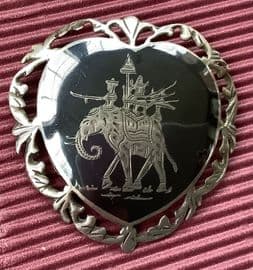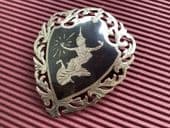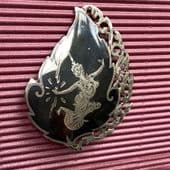Elephant - 1950s Silver Brooch - Sterling Silver Niello work from Siam - Elephant Pin
This is an excellent example of Thai silver and Niello work in jewellery. Here we have a hand crafted vintage Brooch dating to the 1950s and made in Siam. The techniques used in this piece of jewellery include Niello inlay work, Piercing and Engraving - all top skills and so beautifully executed in this little work of art! This particular brooch details an Elephant and this one is a working beast with a tiny Man in a hat sitting on his back. The Elephant is very detailed, his long trunk is nicely curved, you can see his tusks, his eye and his decorative saddle as he goes about his daily tasks. If you love Elephants this could be the brooch for you! It is a heart shaped brooch with curling engraved and pierced silver work edges all around making a stunning frame for the black Niello work, which in turn shows the silver elephant and rider off to perfection! This lovely brooch is a decent size measuring 4.5cms at is widest points. The brooch is in excellent condition. It is left just lightly polished with its Patina relevant to its age. This brooch fastens with a rollover guard over the pin. It is clearly marked SIAM STERLING on the back.
JEWELLERY DETAILS
Designer or Brand: Makers mark - None
Country of Origin: Siam, Thailand
Condition: Excellent
Decade: 1950s
Date: 1950s
Era: Vintage
Style: Oriental
Type: Brooch, Pin
Material: Sterling Silver, 925/1000
Subject: Elephant, Elephants
More about Siam Silver Jewellery and Niello
Siam Sterling jewellery of this kind for the modern mass market was manufactured, usually by highly skilled artisans, from the 1930s through the 1980s. It was very popular in the 1950-60s. Niello had been used in the region for centuries collected by royal and wealthy families there. Although Siam officially changed its name to Thailand in the 1940s, the “Siam” description for this kind of work is well known. The designs incorporated traditional images and figures from legends such as Thai dancers, gods and goddesses, signs of the Zodiac, elephants, animals, peacocks and the royal barge boats. Jewellery available included brooches and pins, bracelets, necklaces, earrings, cuff links and tie pins as well as small decorative pieces such as compacts and pill boxes.
American and British soldiers who visited Thailand in the mid-20th century bought this jewellery as gifts for their loved ones back home, making it a popular mid-century trend. This trend was likely helped further by the popular 20th Century Fox Film - The King and I. Rogers and Hammerstein had written the Musical and Yul Brynner starred as the King of Siam with Deborah Kerr as the governess to his children. The 1956 love story would certainly have added to the desirability of wearable costume jewellery from Siam. The decorative jewellery is usually in Sterling Silver being 925/1000 parts pure silver.
Niello is a method whereby a deep black metal mixture, which melts at a lower temperature than silver is fused onto the metal for decorative effect. The skilled jeweller prepares a silver base with distinctive channels and engraved areas and the molten black metal then fills the crevices on the silver base. Once polished a detailed, contrasting jewel results. Lower levels of sulphur in the black compound give a more grey colour. The contrast of the lustrous black inlay against either matte or polished metal is striking and has resulted in niello being considered an expert decorative technique. The actual technique dates back several thousand years and was known by the Egyptians, Greeks, Celts, Romans Persians and Byzantines. Roman Pliny mentions a method used by ancient Egyptians to blacken silver. The technique of true Niello was perfected by the Italians in the 16th Century and the methods were documented. Many of the Italian silver religious ornaments of that time were produced using Niello work. The name stems from the Latin Nigellum for black.
Siam silver jewellery is also seen finished in true enamel; so the base work is similar but instead of the black Niello a coloured enamel (most often in shades of white, yellow, blue or red) is used.



-3718-1-p.jpeg?w=60&h=9999&v=314BA693-7323-4C69-B6A2-956B199F3085)
-3718-p.jpeg?w=60&h=9999&v=E9D3A347-C414-4327-B12D-1EF99461F695)
-3718-1-p.jpeg?w=60&h=9999&v=EB424880-5C3E-4742-8DF9-52330220C966)
-3718-p.jpeg?w=60&h=9999&v=3C103006-3519-46B0-B882-8600147D4C77)

